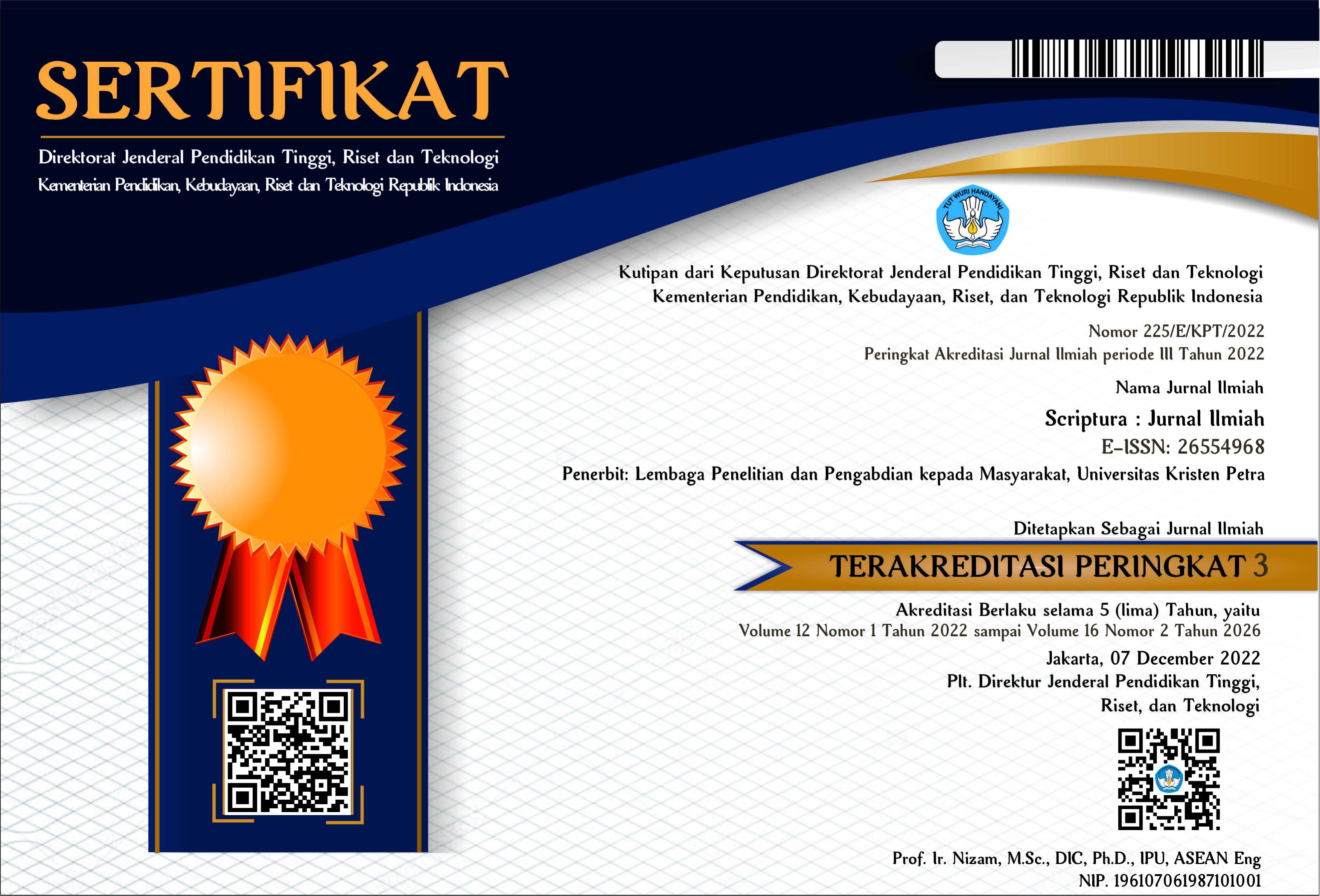RISMA AND AN INSIGHT OF IDEOLOGY IN POLITICAL POWER NARRATIVE
DOI:
https://doi.org/10.9744/scriptura.5.1.31-38Keywords:
Risma, political power, ideology, talk as a communication product, CDA.Abstract
This study aims to determine the discourse in Tri Rismaharini’s utterances as the first female mayor of Surabaya in a prominent talk show program. Woman with a strategic position in political domain is a rare phenomenon in a patriarchal culture. Risma is phenomenal one since not a party cadre, could be a major. As the public support becomes immensely increase of Risma’s leadership. She was confronted a conflict of interests between political parties’s and the public’s. This condition raised issues about Risma’s resignation. In an interview on a private television, Risma revealed about her feeling as leader of the city. How Risma conceives political power? How Risma practices political power? How she engages people to understand and be involved toward her policies ? What about her political ideology ? Risma’s utterances on the program as a form of social act are interesting to be assessed. The method of this study is critical discourse analysis of Teun van Dijk. Van Dijk divides the analysis into three main parts which are the analysis of social, cognitive and discourse analysis. These analysis stages are used to examine the discourse in conversation or texts produced by a communicator. The analysis shows Risma puts political power as a divine mandate/transcendentalism. Secondly as women, Risma has implemented morality and justice as ethical politics further demonstrates masculinity through totality and accepts authority.References
Brown, P dalam McConnell-Ginet dalam Kendall dan Tannen.(2003). Discourse and Gender dalam The Handbook of Discourse Analysis. Victoria: Blackwell Publishing.
Bystrom, D. (2004). “Handbook of Political Communication Research”. New Jersey: Lawrence Erlbaum Associates.
Campus, (2013). Women Political Leaders and the Media. New York: Palgrave Macmillan.
Coates, J. (1995), “language, Gender and Career” dalam “Language and Gender”. England: Long-man Group.
Denton & Woodward. (1991). Dalam McNair, B. (2010). “An Introduction To Political Communication”. New York: Routledge.
Horváth, J. (2009). “Critical discourse analysis of Obama’s political discourse”. http://www.cs. columbia.edu/~sbenus/Teaching/APTD/Horvath_CDO_Obama.pdf
Gilligan, C. in White, R.D. (1999). “Are Women More Ethical ?”, Journal of Public Administration Research and Theory, 9 (3), 459-471.
Kendall, S., dan Tannen. (2003). “Discourse and Gender” dalam “The Handbook of Discourse Analysis”. Victoria : Blackwell Publishing.
Littlejohn, S. and Foss, K.A. (2005). “Theories of Human Communication”. Canada: Thomson.
Napsiah, (2009). Nilai-Nilai Profetik dan Affirmative Action di Partai Politik dalam Gender and Politics. Yogyakarta: Tiara Wacana.
Van Dijk, T. (2009), Society & Discourse: How Social Context Influence Text and Talk. New York: Cambridge University Press.
Van Dijk, T. (1995). Discourse Analysis as Ideology Analysis, dalam Wenden, A. and Schaffner, C. (eds) Languange and Peace (in press).
Sundeland, J. (2004). “Gendered Discourses”. New York: Palgrave Macmillan.
Risma Super Wali, Detik Magazine, September, 9th-15th, 2013
Downloads
Published
How to Cite
Issue
Section
License
Authors who publish in the SCRIPTURA Jurnal Ilmiah agree to the following terms:
Authors retain unrestricted copyright and full publishing rights. The authors grant the Publisher the right of first publication, with the work simultaneously licensed under the terms and conditions of the Creative Commons Attribution License (CC BY) that allows for unlimited use, distribution, and content reproduction on all media as long as the original author and source are properly acknowledged and cited.

















